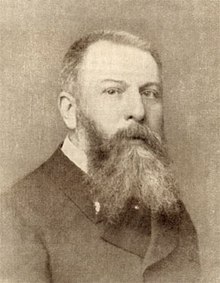Antonio di Rudinì
| Antonio di Rudinì | |
|---|---|
 |
|
| 12th Prime Minister of Italy | |
|
In office 10 March 1896 – 29 June 1898 |
|
| Monarch | Umberto I |
| Preceded by | Francesco Crispi |
| Succeeded by | Luigi Pelloux |
|
In office 6 February 1891 – 15 May 1892 |
|
| Monarch | Umberto I |
| Preceded by | Francesco Crispi |
| Succeeded by | Giovanni Giolitti |
| Personal details | |
| Born |
16 April 1839 Palermo |
| Died | 6 August 1908 (aged 69) Rome |
| Political party | Historical Right |
Antonio Starabba, Marquess of Rudinì (16 April 1839 – 7 August 1908) was Prime Minister of Italy between 1891 and 1892 and from 1896 until 1898.
He was born in Palermo (then part of the Kingdom of the Two Sicilies) into an Sicilian family. However, his family was of a more cultured, liberal disposition than many of their contemporaries.
In 1859, he joined the revolutionary committee which paved the way for Garibaldi's triumphs in the following year. After spending a short time at Turin as attaché to the Italian foreign office, he was elected mayor of Palermo. In 1866, he displayed considerable personal courage and energy in quelling an insurrection of separatist and reactionary tendencies. The prestige thus acquired led to his appointment as prefect of Palermo. It was while occupying that position that he put down brigandage throughout the province. In 1868, he was prefect of Naples.
In October 1869 he became minister of the interior in the Menabrea cabinet. The cabinet fell a few months later, and although Starabba was an elected member of parliament for Canicattì, he held no important position until, upon the death of Marco Minghetti in 1886, he became leader of the Right.
Early in 1891, he succeeded Francesco Crispi as premier and minister of foreign affairs, forming a coalition cabinet with a part of the Left under Giovanni Nicotera. His administration proved vacillating, but it initiated the economic reforms by virtue of which Italian finances were put on a sound basis and also renewed the Triple Alliance.
He was overthrown in May 1892 by a vote of the Chamber and was succeeded by Giovanni Giolitti. Upon the return of his rival, Crispi, to power in December 1893, he resumed political activity, allying himself with the Radical leader, Felice Cavallotti.
The crisis consequent upon the disaster of Adowa enabled Rudinì to return to power as premier and minister of the interior in a cabinet formed by the veteran Conservative, General Ricotti. He signed the Treaty of Addis Ababa that formally ended the First Italo–Ethiopian War recognizing Ethiopia as an independent country. He endangered relations with Great Britain by the unauthorized publication of confidential diplomatic correspondence in a Green-book on Abyssinian affairs.
...
Wikipedia
